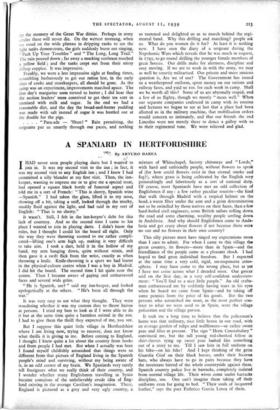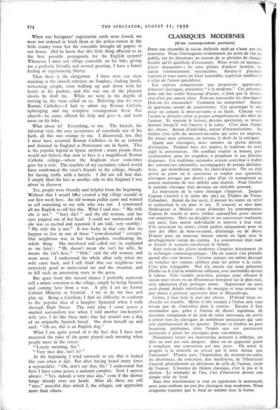A SPANIARD IN HERTFORDSHIRE
- By ARTURO BAREA
y HAD never seen people playing darts but I wanted to I join in. It was my second visit to the inn ; in fact, it was my second visit to any English inn ; and I knew I had committed a silly blunder at my first visit. Then, the inn- keeper, wanting to impress me or to give me a special treat, had opened a square black bottle of funereal aspect and told me in a sort of French: "This is sherry, Spanish wine —Spanish." I had taken the glass, lifted it to my nose, showing off a bit, taking a sniff, looked through the murky, muddy fluid against the light, and had said in my sort of English: "That is no sherry."
It wasn't. Still, I felt in the inn-keeper's debt for this lack of courtesy. And so the second time I came to his place I wanted to join in playing darts. I didn't know the rules, but I thought I could hit the board all right. Only the way they were throwing seemed to me rather compli- cated—lifting one's arm high up, making it very difficult to take aim. I took a dart, held it in the hollow of my hand, my arm hanging down, quite without strain, and then gave it a swift flick from the wrist, exactly as when throwing a knife. Knife-throwing is a sport we had learnt in the physical-culture centre when I was a boy in Madrid. I did hit the board. The second time I hit quite near the centre. Then I became aware of gaping and embarrassed faces and several wide grins.
"He is Spanish, see? " said my inn-keeper, and looked apologetically at the others. "He's been all through the war."
It was very easy to see what they thought. They were wondering whether it was my custom thus to throw knives at persons. I tried my best to look as if I were able to do it but at the same time quite a harmless animal in the zoo. I had to give them the thrill they expected of me, you see.
But I suppose this quiet little village in Hertfordshire where I am living now, trying to recover, does not know what thrills it is giving to me. Before coming to England, I thought I knew quite a lot about the country from books and from people I had met. But when I actually was here I found myself childishly astonished that things were so different from that picture of England living in the Spanish people's mind and surviving, without my being aware of it, in an odd corner of my brain. We Spaniards very rarely tell foreigners what we really think of their country, and I wonder whether many Englishmen travelling in Spain became conscious of the unbelievably crude idea of Eng- land existing in the average Castilian's imagination. There, England is pictured as a grey and very ugly country, a mixture of Whitechapel, factory chimneys and "Lords," with hard and unfriendly people, without flowers to speak of (for how could flowers exist in that eternal smoke and fog?), where grass is being cultivated by the English very painstakingly and laboriously as a sort of national duty. Of course, most Spaniards have met an odd collection of Englishmen if any: a few rather peculiar tourists—the kind that walk through Madrid with a tropical helmet on the head, a water filter under the arm and a grim determination not to be swindled by those natives on their faces, then a few hard-boiled civil engineers, some British sailors rolling down the road and some charming, wealthy people settling down in Andalusia. And why should Englishmen come to Anda- lusia and get crazy about flowers if not because there were no sun and no flowers in their own country?
This silly picture must have tinged my expectations more than I care to admit. For when I came to this village the green country, its flowers—more than in Spain—and the friendliness of the people came as a pleasant shock. I had hoped to find great individual freedom. But I expected at the same time a very cold, rigid, un-responsive atmo- sphere. I may have come to the wrong place, but as yet I have not come across what I dreaded most. Our grocer said on the first day, in a very self-confident understate- ment: "You'll find us a nice little people." An old crafts- man embarrassed me by suddenly having tears in his eyes when he heard we came from Spain—and by taking off some pennies from the price of his goods. But the two persons who astonished me most, as the most perfect con- trast to what we were used to in Spain, were the village policeman and the village parson.
It took me a long time to believe that the policeman's home was that ordinary, nice little house in our road, with an average garden of tulips and wallflowers—or rather sweet peas and lilies at present. The sign " Herts Constabulary" convinced me, but the tall young red-cheeked fellow in shirt-sleeves tying up sweet peas looked like something out of a story to me. Till I saw him in full uniform on his bike—on his bike! And I kept thinking of the grim Guardia Civil on their black horses, under their bicorne hats, who always have to go in pairs because they have the inveterate hatred of the whole countryside against them. Spanish country police live in barracks, completely isolated from normal village life. Their wives come under barracks discipline, too. One can't imagine them taking off their uniforms even for going to bed. "Their souls of lacquered leather," says the poet Federico Garcia Lorca of them. When our foreigners' registration cards were issued, we were not ordered to fetch them at the police-station in the little county town but the constable brought all papers to our house. Did he know that this little thing affected us as the best possible propaganda for the English system?
Whenever I meet our village constable on his bike, giving me a perfectly friendly and normal greeting, I have a funny feeling of experiencing liberty.
Then there is the clergyman. I have seen cur vicar standing at the church entrance on Sundays, shaking hands, welcoming people, even walking up and down with his hands in his pockets, and this was one of the pleasant shocks he dealt me. While we were in the depths of moving in, the vicar called on us. Believing that we were Roman Catholics—I had to admit my Roman Catholic upbringing and my complete estrangement from that church—he came, offered his help and gave it, and went away on his bike.
What about it? Everything, to me. The bicycle, the informal visit, the easy acceptance of somebody not of his faith, all this was strange to me. I discovered, too, that I must have assumed Roman Catholics to be as isolated and shunned in England as Protestants are in Spain. This is the popular legend in Spain, anyhow ; many people there would not believe that near to here is a magnificent Roman Catholic college—where the Anglican vicar sometimes goes for a visit. The teachers of my secondary school would have condemned the vicar's friends in the college, though, for having traffic with a heretic. I did not tell him that. I simply filed the fact as another side to this England I was about to discover.
Yes, people were friendly and helpful from the beginning. Without that I would have created a big village scandal in our first week here. An old woman pedlar came and wanted to sell something to my wife who was out I summoned all my English to tell her this. What I said was : "My wife she is not." "Isn't she? " said the old woman, and her eyes popped out of her head. I could not understand why she was so excited and repeated (I am told, very sternly): "My wife she is not." It was lucky in that case that we happen to live in one of those " semi-detached " cottages.
Our neighbour was in her back-garden, overhearing the whole thing. She interfered and called out (as explained to me later): "He doesn't mean she isn't his wife, he means she isn't here." "Ooh," said the old woman, and went away. I understood the whole affair only when my wife came back, and I still think that our neighbour was extremely good to understand me and the situation, and to kill such an interesting story in the germ.
But apart from this missed chance I probably represent still a minor sensation to the village, simply by being Spanish and coming here from a war. A pity I am no former Cabinet Minister or General. I try to do my best and play up. Being a Castilian, I find no difficulty to conform to the popular idea of a haughty Spaniard when I walk through High Street. The only time I came across a marked nationalism was when I told another inn-keeper's wife (yes, I do like these inns) that her spaniel was a dog of an originally Spanish breed. She drew herself up and said : "Oh no, this is an English dog."
What I am quite proud of is the fact that I have now mastered the rules of the game played each morning when people meet in the street : "Lovely morning, Sir."
"Very nice day, isn't it?"
At the beginning I tried earnestly to say that it looked like rain when it did. But after having heard many times a reproachful: "Oh, don't say that, Sir," I understand that here I have come across a national complex. Now I answer always : "Yes, indeed, a very nice day," even if the shower hangs already over our heads. After all, these are still "nice," peaceful days which I, the refugee, can appreciate more than others.









































 Previous page
Previous page